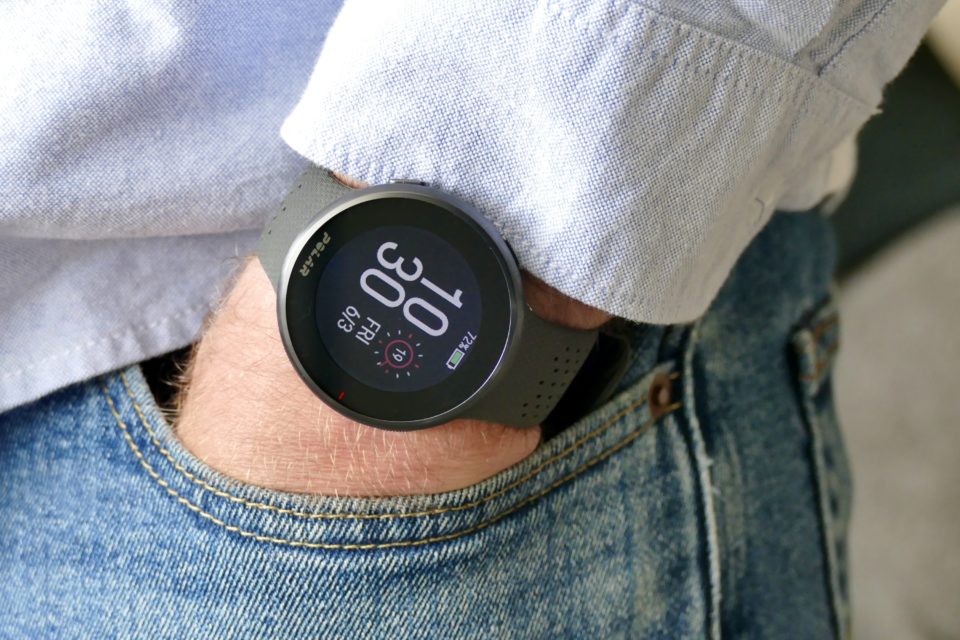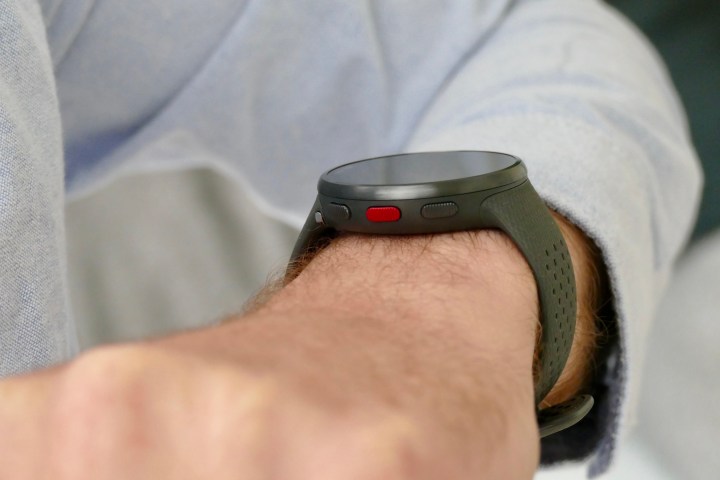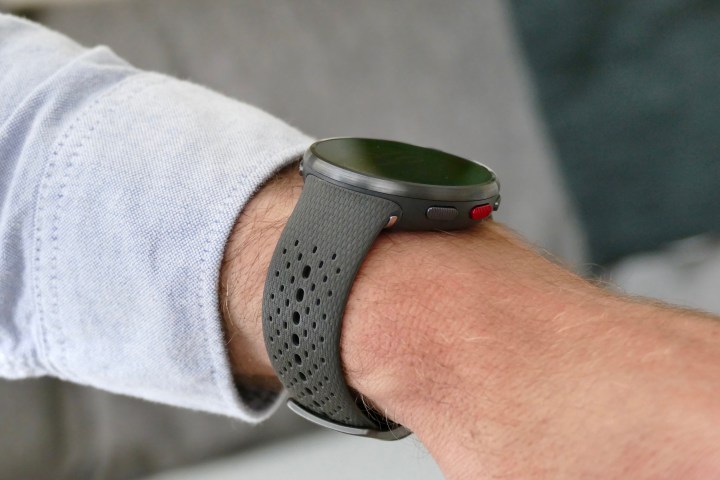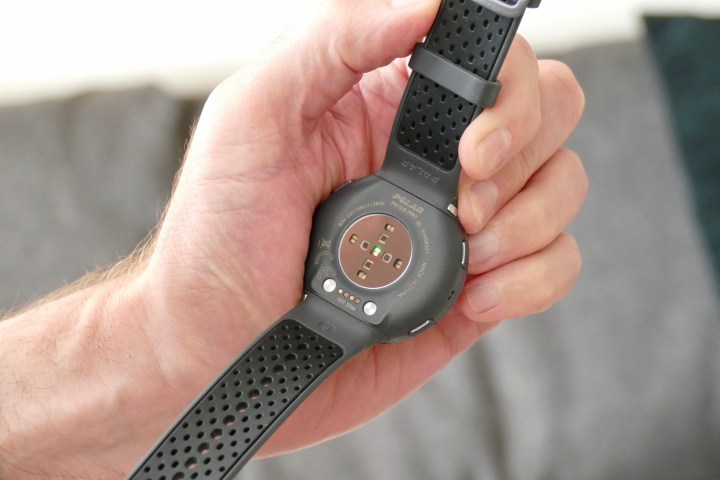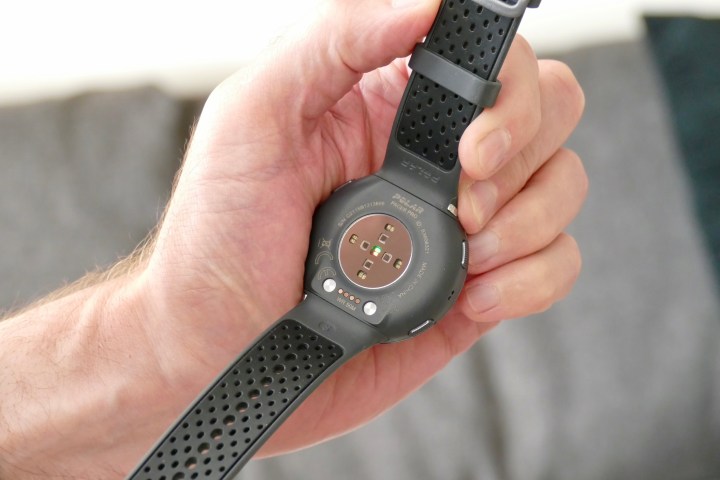Polar Pacer Pro
MSRP $300.00
“The Polar Pacer Pro is designed for runners and serious sportspeople, where the data-rich software and comfortable, slimline design makes sense, but casual exercisers risk being overwhelmed.”
pros
-
Slim and lightweight
-
Fast and accurate GPS
-
Comprehensive fitness tracking
-
Masses of data on watch and in app
cons
-
Low quality screen lacks brightness
-
No Sp02 sensor
A smartwatch is not just a smartwatch, there are different versions better suited to different activities and situations. Some suit wear, others have a sportier design for the gym, and some even everyday look a bit like a diver’s watch. Then you have sports smartwatches such as the focus of this review, the Polar Pacer Pro. The design is overtly sporty, and its functionality is built around the sporty person.
But does this level of focus make it only suitable for someone really into running or another sport? I’ve worn the Pacer Pro for more than 10 days to find out.
design
Smartwatches don’t get much more simple than the Polar Pacer Pro. The circular case is made of plastic, the bezel is aluminum, and there are five buttons around the edge. The diameter is around 44mm, and in total it weighs about 40 grams. It’s attached to a comfortable, very flexible, and highly customizable silicon strap. There are two versions in the box, and I found the smaller version fine for my 6.5-inch wrist, as the long version bordered on ridiculously long. There are multiple holes to get the tightness just right, and two keepers to make sure the end doesn’t flap about.
Gorilla Glass 3.0 protects the 1.2-inch Memory-in-Pixel (MIP) screen, which has been brought closer to the surface compared to previous Polar watches, and it has an improved backlight. In the serious gray color seen in our photos, the Pacer Pro is anonymous to look at. I took little pride in wearing the Polar Pacer Pro because it has such a basic look. There’s nothing wrong with it, it’s just not exciting in the least. That said, it’s very comfortable and I have been able to wear it all day and overnight without it getting sweaty or causing a skin reaction.
The massive bezel around the screen ages the design, which combined with the screen’s lowly 240 x 240 resolution, makes the Pacer Pro look like a watch that has been out for years rather than a new 2022 model. The screen doesn’t have an automatic brightness adjustment either. You can set it at low, medium, or high brightness, or control it manually using one of the side buttons. On anything less than high brightness, you can’t see very well in sunlight, and the viewing angles are tight. It does reliably illuminate when you raise your wrist though, unless you select the manual setting for the backlight.
The basic look and screen mean I had to force myself to wear the Pacer Pro. It’s not a smartwatch to look at and think, wow, I love that design, or for the screen to illuminate and show beautiful, detailed animations. It’s generically functional, and I personally need more than that from something I wear. However, compared to many other dedicated GPS sports smartwatches it’s a stunner, with a slim case and innocuous design that’s way more suitable for everyday wear than you normally expect.
software and apps
The software on the Polar Pacer Pro is a step back in time, visually. There are lots of simple lines, colors, and pixels, and not much in terms of design flair. It’s solidly functional. You use the multiple buttons to move through the menus, and the lack of a touchscreen adds to the retro feel but makes sense when you consider ease of use when running. Additional processing power and more RAM over previous Polar smartwatches make it snappy and easy to live with on a daily basis. I haven’t been frustrated by any aspect of the Pacer Pro’s performance.
Polar has made the software so it’s not always necessary to visit the app. Different screens show all the data you could want about your sleep, workout performance, and even suggestions on exercises to do that day. Select these and you get a choice of several workouts, all with different amounts of time, and then simple instructions to follow. Each is easier to personalize, and far more varied and interesting than the guided workout sessions on smartwatches like the Huawei Watch GT Runner and the Tag Heuer Connected Caliber E4.
What’s clear from using the Polar Pacer Pro is it rewards continued use, and that if you’re not really that sporty you won’t benefit from its true ability. It requires multiple workouts and multiple nights of sleep tracked before it will provide much in the way of in-depth analysis, so casually active people will wonder if it’s doing much at all for a while. When you aren’t on track with a sleep or exercise regime it makes it clear too. Have a bad night’s sleep and “Compromised” appears in yellow on the sleep screen to remind you how rubbish you are, and the workout screen counts the days since you last worked out, to motivate or guilt you into doing something.
Keeping you out of the app isn’t a bad thing. It’s not the prettiest or most immediately accessible I’ve used. Again, it requires many days of data to start showing any meaningful information. There are multiple graphs, a lot of granular detail, and plenty of information on what it all means, but it’s relatively light on motivation outside of this. If you’re serious about sport and health, then pouring over all the numbers will probably be your motivation, but if you’re not, the number-heavy presentation can be off-putting.
I have used the smartwatch with an iPhone 13 Pro and it has reliably shown my notifications, the vibration alert is noticeable, and there’s the option to control music from my phone too. It does not run other apps, so don’t expect to use Spotify or a similar app when out without your phone.
Workouts and accuracy
It’s when you track a workout and compare it to a more standard smartwatch that the Polar Pacer Pro’s strengths are revealed. A 40-minute outdoor walk tracked on the Apple Watch Series 7 shows general information most people will be interested in — heart rate, distance, pace, and calories — but the Pacer Pro goes a step beyond this.
Training zones are isolated and are mapped out using pace and heart rate data, it breaks down calorie burn into carbs, protein, and fat, there’s a detailed route map and information on heart rate, speed, and pace for each lap. Once you’ve tracked enough workouts, the app builds a baseline to show your performance and where to improve, and your VO2 Max data will also start to come into play. Runners get a host of additional features including training plans, running power measurements, and training load data too. All of this shows how the Polar Pacer Pro is aimed at the serious runner or sports person.
All the usual workouts are ready to be tracked on the watch, including running, walking, cycling, and swimming, plus weight training and the option to pick a generic indoor our outdoor activity if nothing really fits. There’s no specific option for golf or activities like horse riding or yoga, but the Multisport feature may appeal to triathletes. The Polar Pacer Pro has its own GPS which found a signal very quickly during my tests and matched the Apple Watch for accuracy, as did the heart rate sensor.
Wear the Pacer Pro overnight and it will track your sleep. It matched the heart rate data collected by my Oura ring, but the pair differed on the amount of time spent in different sleep stages. I’m more inclined to believe the Pacer Pro’s data though. It gives a Nightly Recharge score alongside the usual Sleep Score, which helps you understand how restful your night was, and whether it should affect plans to exercise. If you’re ready for it, the watch also has workout and running plans to follow, some of which appear to be very challenging.
I’m well aware I’m not the target audience for the Polar Pacer Pro, and am ill-equipped to test its limits personally. It even took a few tries using the beginner VO2 Max walking test for it to recognize my “ability.” However, seeing the level of detail once you’ve completed enough sessions — it shows if you’re training enough, doing too little or too much, and sets clear targets based on your progress — combined with its accuracy, activity planning, and general on-wrist comfort gives me confidence it’ll work very well for those who love running and want to get even fitter.
It’s disappointing that the Polar Pacer Pro doesn’t have an Sp02 sensor or an electrocardiogram (ECG), both of which are common on competing smartwatches.
Battery and charging
Battery life has been good. Polar’s seven-day estimate is a little conservative if you only track a couple of workouts plus your sleep, when you should see the smartwatch last for eight or nine days. Add GPS into the mix more regularly and seven days is about right. Polar claims a total of 35 hours total training time with GPS and the heart rate sensor active.
Charging is quite slow and takes about two hours to go from under 10% to capacity. A proprietary charger that magnetically attaches to the smartwatch’s case back is included in the box.
Price and availability
the Polar Pacer Pro is available now for $300 or 259 British pounds. It comes in the basic black color — Polar calls it Carbon Gray — seen in our photos, or in a prettier Midnight Blue, Snow White, or Autumn Maroon.
Our take
The Polar Pacer Pro doesn’t look or feel especially new, and it doesn’t really bring anything new to the table either. It matches the capability of similarly priced fitness-oriented smartwatches but doesn’t provide a standout reason to buy at least in terms of features and design. It’s even missing some sensors that are standard on other fitness smartwatches and bands.
That leaves the Polar software. I only scratched the surface of what it’s capable of, and the data it returns may look overwhelming to the casual owner wanting to know a little bit more about their health and activity. For the dedicated runner (yes, it’s primarily going to appeal to runners) though, the depth of detail, fast and accurate GPS, and good battery life will make it very appealing.
It’s then the design comes into its own. The slim, lightweight case is so much more wearable than chunky, rough-and-tumble GPS watches seen before. It’s not stylish like a Huawei Watch GT 3 Pro, but it’s simple and subtle. All the functionality an athlete (budding or otherwise) wants, but not wrapped up in an obscenely proportioned case for once. You’ve got to really want the Polar software experience, but if you do, the Pacer Pro is the ideal way to get it.
Is there a better alternative?
It depends a little on what you want. If you want an all-out sports watch, the Garmin Forerunner 245 Music competes on price, plus the Garmin Vivomove Sport brings Garmin’s excellent software platform to a great looking smartwatch. If you want a more health-focused smartwatch take a look at the Withing’s ScanWatch or ScanWatch Horizon.
If you don’t think the really hardcore sports tracking will be for you, then the Apple Watch Series 7 is the best smartwatch if you own an iPhone, and the Samsung Galaxy Watch 4 remains the strongest choice if you own an Android phone.
How long will it last?
The Polar Pacer Pro has a 50-meter water resistance rating, and has apparently been tested to “military standards,” so expect it to be pretty durable. The strap is easily replaced if it breaks, but the special pin system used to secure it means you will have to buy one directly from Polar. The software is proprietary and updates can be added via the app. The Pacer Pro’s overall ability means you’re unlikely to hit its limits any time soon, and its ordinary design won’t succeed to fashion trends either. It’ll last you for many years.
Should you buy it?
Yes, but provided you’re aware this is a sports smartwatch for sporty people. It’s not an Apple Watch alternative.
Editors’ Recommendations
